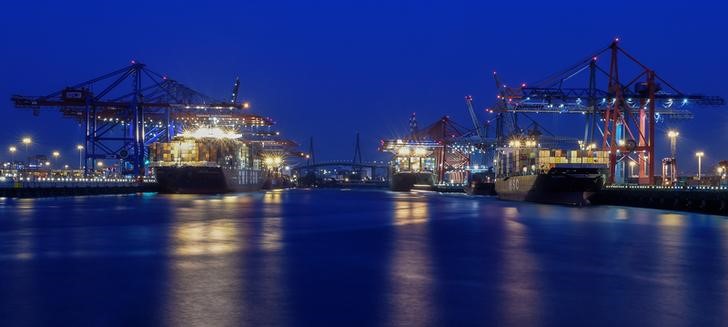By Michelle Martin
BERLIN (Reuters) - German exports fell sharply in November and industrial output also declined, suggesting Europe's largest economy ended 2014 on a weak note.
The slowdown in the euro zone anchor both reflected and further fed weakness across the currency bloc, which is still struggling to emerge from a long-running economic crisis.
Some economists thought the rapid fall in oil prices could provide a boost for Germany's powerful exporters in the future, while a weakening the euro may help companies selling beyond Europe.
In November however, seasonally-adjusted exports dropped for a second consecutive month, dipping by a bigger-than-expected 2.1 percent, data from the Federal Statistics Office showed on Friday.
Industrial output decreased by 0.1 percent as construction activity weakened and energy production fell, separate Economy Ministry data showed. That was weaker than a consensus forecast for a 0.4 percent increase and came as Spanish industrial production stagnated while French output dropped 0.3 percent.
Alongside earlier figures that showed German industrial orders plunging, Friday's figures complete a poor outlook for the fourth quarter.
"Today's data provides further evidence that the German economy has not yet fully recovered from the soft spell of the summer," said Carsten Brzeski, economist at ING.
Economists generally expect Germany to post meagre growth in the fourth quarter, rounding off a disappointing year which saw the economy contract in the second quarter and barely grow in the third.
Bankhaus Lampe economist Alexander Krueger said while production - which rose by 1.0 percent in the less volatile two-month comparison - probably boosted gross domestic product (GDP) in the fourth quarter, the economy was unlikely to have grown by more than 0.2 percent between October and December.
There have been some positive signs for fourth-quarter growth though. Sentiment indicators took a turn for the better late last year and retail sales climbed in October and November.
Full-year 2014 GDP data is due on Thursday. The government has forecast 1.2 percent growth.
While Germany has traditionally been an export-oriented economy, shipments abroad have suffered this year as demand from weakened euro zone trading partners faltered and crises abroad hurt business confidence, leading to investment delays.
A breakdown of unadjusted trade data showed shipments to the European Union, Germany's largest export market, rising 4.8 percent on the year in November, while exports to countries outside Europe dropped 3.0 percent.
Volker Treier, head of foreign trade at Germany's DIHK Chambers of Commerce said the export outlook for 2015 was better, partly due to the oil price halving in six months.

"That's a stimulus package for the global economy, especially for Asian emerging markets that have fewer raw materials like China, India and Thailand - that boosts middle class purchasing power and supports demand for German products," he said, adding the weaker euro also helped.